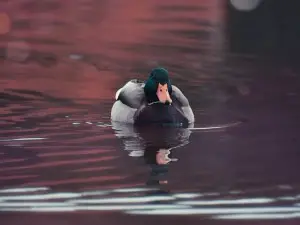
Animals need to eat in order to survive, food gives animals the energy that they need to survive and perform daily activities.
If a bird were to stop eating the bird would eventually die, this article explores why your duck isn’t eating and what to do about it
Table of Contents
Duck not eating:
A change in your duck’s behavior is a sign that there is something going on with the bird, here are reasons why your duck isn’t eating and what to do
The bird may be sick:
Animals of all types will abstain from eating, or will eat much less, when they are sick.
Animal bodies know that the digestion of foods requires energy, the bodies also know that energy is better off being used to heal the animal of its sickness. Thus the animal’s body will keep the animal from eating.
What to do:
There are a variety of illnesses that may be affecting your bird, if you don’t know what is wrong with your bird then you’d need to contact a veterinarian and set up a consultation for your bird.
Taking your bird to the vet is recommended because getting the bird diagnosed and healthy again will enable it to get better, eat normally, and go back to normal.
The vet will be able to quickly and accurately diagnose your bird and offer treatment options for the animal.
Note: Many of the illnesses that plague your duck will also cause the bird to develop dehydration, but the bird may not want to drink water on its own or may completely keep away from water sources.
If this happens you’d have to syringe feed water to your bird and make sure it drinks.
Giving electrolytes to the bird is also recommended. These will not only help rehydrate the bird, but they will also help to relieve any diarrhea or heat exhaustion and improve your bird’s overall mood.
Preferences:
If you’ve recently changed your bird’s diet, and the bird is now refusing to eat, then the bird may simply not like what is being offered and will as a result not eat.
Perhaps you’ve started feeding your duck pellets. If one or some of your ducks don’t like pellets then they won’t eat the food. If the duck doesn’t like the pellets offered then it may discard the pellets from its bill or not eat the pellets at all.
What to do:
If you’ve recently changed your bird’s diet then you’d need to either go back to what you were previously feeding the bird or change the bird’s diet again to something that it would enjoy eating.
Perhaps you can start giving your bird a crumble or a mash instead of feeding the bird pellets. You can also try to mash the pellets, the bird may simply not like the texture of the pellets.
Trying different brands of pellets may also help. A bird may not be fond of one brand but may enjoy eating another brand of pellets.
If this doesn’t work on your bird then you can try fermenting the bird’s feed, doing this is said to be nutritionally better for the bird.
Parasitic infections:
Another reason why your bird may not be eating may be because the bird has a parasitic infection.
A variety of parasites can affect ducks and other birds. Mites in particular can cause your bird to lose its appetite and not want to eat.
Other symptoms of worms in your bird include dull-looking eyes, blackened feathers, fewer eggs being laid, and a loss of weight.
What to do:
Start off by checking your bird for this parasite. The best time to check for mites is at night, this is when the mites will move from your bird’s housing structures onto the birds. When looking for mites check your bird’s ventral region.
If you do find mites on your bird’s body you can treat the bird using Carbaryl, use this chemical topically on the bird. When using this chemical make sure to avoid getting it into your bird’s eyes and avoid inhaling it.
Nesting:
Nesting brings out a variety of odd behaviors in ducks, one of these odd behaviors includes a loss of appetite which will eventually lead to lethargy.
What to do:
If you realize that your ducks have a lack of appetite, and the ducks are nesting, but you don’t want a new set of ducklings or goslings running around, then you’d need to stop the nesting by removing the eggs from under the ducks and dispersing the bird’s nest.
The bird will naturally create a new nest after you’ve removed the old nest so you’d need to continue to remove the nest until your bird stops nesting altogether
If you enjoyed this article then you may also be interested in other chicken related articles. Here are some articles that you may be interested in: Wild Duck Limping, Duckling Curled feet, Hens Picking On Rooster, Duck Lethargic Not Eating, How Do I Know If My Duck Is Dying

